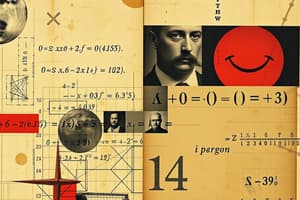Podcast
Questions and Answers
What is the absolute value?
What is the absolute value?
- A whole number that can be positive, negative, or zero
- The result of multiplication
- A number that gives zero when added to a given number
- The distance from zero on a number line from either the positive or negative side (correct)
What is the additive inverse?
What is the additive inverse?
A number that when added to a given number gives zero as a result
What does the Addition Property of Equality state?
What does the Addition Property of Equality state?
If we add the same quantity to both sides of an equation, then our equation remains the same
What happens in the Associative Property of Addition?
What happens in the Associative Property of Addition?
What is the Associative Property of Multiplication?
What is the Associative Property of Multiplication?
What does the Commutative Property of Addition dictate?
What does the Commutative Property of Addition dictate?
What is the Commutative Property of Multiplication?
What is the Commutative Property of Multiplication?
What is the Distributive Property?
What is the Distributive Property?
What does the Division Property of Equality state?
What does the Division Property of Equality state?
What is the Identity Property of Addition?
What is the Identity Property of Addition?
What does the Identity Property of Multiplication state?
What does the Identity Property of Multiplication state?
Define an integer.
Define an integer.
What is an inverse operation?
What is an inverse operation?
What does it mean to isolate a variable?
What does it mean to isolate a variable?
What is the Multiplication Property of Equality?
What is the Multiplication Property of Equality?
What does the term 'opposite' refer to in mathematics?
What does the term 'opposite' refer to in mathematics?
What are the Order of Operations?
What are the Order of Operations?
Define product in mathematical terms.
Define product in mathematical terms.
What is a quotient?
What is a quotient?
What is a solution in algebra?
What is a solution in algebra?
State the Subtraction Property of Equality.
State the Subtraction Property of Equality.
What is a variable?
What is a variable?
What does the Associative Property of Equality state?
What does the Associative Property of Equality state?
Flashcards are hidden until you start studying
Study Notes
Absolute Value
- Represents the distance from zero on a number line, regardless of direction (positive or negative).
Additive Inverse
- Refers to a number that, when added to another number, results in zero.
Addition Property of Equality
- States that adding the same value to both sides of an equation keeps it balanced.
Associative Property of Addition
- Changing the grouping of numbers does not affect the sum: (a + b) + c = a + (b + c).
Associative Property of Multiplication
- Changing the grouping of factors does not affect the product: (a x b) x c = a x (b x c).
Commutative Property of Addition
- Changing the order of the numbers does not change the sum: a + b = b + a.
Commutative Property of Multiplication
- Changing the order of the factors does not change the product: a x b = b x a.
Distributive Property
- Multiplying a number by a sum is equivalent to multiplying each addend separately: a x (b + c) = a x b + a x c.
Division Property of Equality
- Dividing both sides of an equation by the same non-zero number maintains equality.
Identity Property of Addition
- Adding zero to any number does not change its value: a + 0 = a.
Identity Property of Multiplication
- Multiplying any number by one does not change its value: a x 1 = a.
Integer
- Defined as a whole number that can be positive, negative, or zero, without fractions or decimals.
Inverse Operation
- Refers to an operation that reverses the effect of a previous operation.
Isolate
- The process of rearranging an equation so that a variable stands alone.
Multiplication Property of Equality
- States that multiplying both sides of an equation by the same number keeps it balanced.
Opposite
- Refers to pairs of numbers that are equidistant from zero, but in opposite directions (e.g., -4 and +4).
Order of Operations
- A set of rules (PEMDAS) that dictates the sequence in which calculations are performed in an expression.
Product
- The outcome of multiplication operations.
Quotient
- The result obtained from division operations.
Solution
- Represents the value(s) that can be substituted into a variable to satisfy an equation.
Subtraction Property of Equality
- States that subtracting the same number from both sides of an equation maintains equality.
Variable
- A symbol used as a placeholder for quantities that may change or vary.
Associative Property of Equality
- Similar to the addition property, it states that adding the same number to both sides of an equation preserves its equality.
Studying That Suits You
Use AI to generate personalized quizzes and flashcards to suit your learning preferences.




